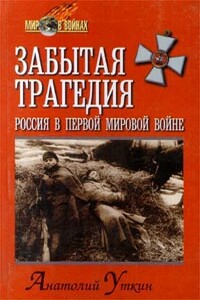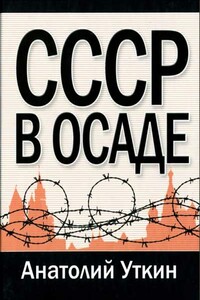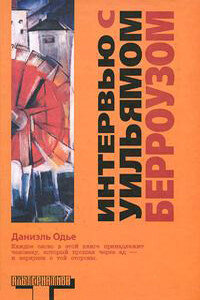Удар американских Богов [заметки]
1
1 Marr Ph. Democracy in the Rough («Current history», p. 26).
2
2 Garrison J. America as Empire. Global Leader or Rogue Power? San Francisco: Berrett-Koehler, Inc. 2004., p.15
3
3 Mandelbaum M. Inadequacy of Amerpican Power («Foreign Affairs», September/October 2002, p.61).
4
4 Mandelbaum M. Inadequacy of American Power («Foreign Affairs», September/October 2002, p.61).
5
5 Donnelly Th. The Past as Prologue: An Imperial Manual («Foreign Affairs», July/August 2002, p.87)
6
6 Glennon M. What’s Law Got to Do with It («Wilson Quarterly», Summer 2002, p. 59).
7
7 Ikenberry J. America’s Liberal Hegemony («Current history», January 1999, p. 26).
8
8 Brooks S. and Wohlworth W. American Primacy in Perspective («Foreign Affairs», July/August 2002, p.24).
9
9 Ikenberry J. Getting hegemony right («National Interest», Spring 2001).
10
10 Mearsheimer J. The Tragedy of Great power politics. New York; Norton, 2002.
11
11 Wallerstein I. The Decline of American Power. The U.S. in a Chaotic World. New York: The New Press, 2003, p. 16.
12
12 Wallerstein I. The Decline of American Power. The U.S. in a Chaotic World. New York: The New Press, 2003, p. 38.
13
13 Barnett Th. Blueprint for Action. A Future Worth Creating. New York: G.P. Putnam’s Son’s. 2005, p. 96–97.
14
14 Feldstein M. Achieving Oil Security («National Interest», Spring 2002).
15
15 Telhami S. Understanding the American Oil Strategy («Brookings Review», Spring 2002, p. 33–34).
16
16 Кларк У. Как победить в современной войне. Ирак, терроризм и Американская империя. М., 2004, с. 137.
17
17 Project for a New American Century. January 26,1998.
18
18 Кларк У. Как победить в современной войне. Ирак, терроризм и Американская империя. М., 2004, с. 141.
19
19 Telhami S. Understanding the American Oil Strategy («Brookings Review», Spring 2002, p.35).
20
20 Telhami S. Understanding the American Oil Strategy («Brookings Review», Spring 2002, p.33).
21
21 «Washington Post», January 17, 2001.
22
22 Кларк У. Как победить в современной войне. Ирак, терроризм и Американская империя. М., 2004, с. 146.
23
23 Barnett Th. Blueprint for Action, A Future Worth Creating. New York: G.P. Putnam’s Sons, 2005, p. 90.
24
24 Barnett Th. Blueprint for Action, A Future Worth Creating. New York: G.P. Putnam’s Sons, 2005, p. 83.
25
25 Sageman M. Understanding Terror Networks. Philadelphia: University of Pennsylvania Press, 2004, p. 2
26
26 Kaplan R. Warrior Politics: Why Leadership Demands a Pagan Ethos. New York: Random House, 2001, p. 31
27
27 Creveld, Martin van. The Transformation of War: The Most Radical Reinterpretation of Armed Conflict Since Clausewitz. New York: Free Press, 1991; Kaplan R. The Coming Anarchy: Shattering the Dream of the Post — Cold War. New York: Random House, 2000.
28
28 Barnett Th. Blueprint for Action, A Future Worth Creating. New York: G.P. Putnam’s Sons, 2005, p. 96.
29
29 «New York Times», July 10,1994, p.20.
30
30 Hirsh M. Bush and the World («Foreign Affairs», September/ October 2002, p. 40).
31
31 «El Pais», 31,03,2002.
32
32 Bearden M. Afganistan, Graveyard of Empires («Foreign Affairs», November-December 2001, p.20).
33
Саладдин (1138–1193) объединил исламский мир, победив вождя крестоносцев Ричарда Львиное Сердце. По мнению ряда историков, он «полностью отдал себя мусульманской идее». По мнению, скажем, Г. Видала, «его дух вернулся».
34
33 Indyk M. Back to the Bazaar («Foreign Affairs», January-February 2002, p.75).
35
34 Cohen E. A Strange War («The National interest», Spring 2002, p.32).
36
35 Woods K., Lacey J. and Murrey W. Saddam’s Delusions: The View from the Inside («Foreign Affairs», May/June 2006, p. 15.
37
36 «Le Figaro», avril 8,2002.
38
37 Simes D. What War Means («The National interest», Spring 2002, p.48).
39
38 Anonymous. Imperial Hubris. Why the West Is Losing the War on Terror. Washington, D.C. Brassey’s Inc., 2004, p. 3.
40
39 Anonymous. Imperial Hubris. Why the West Is Losing the War on Terror. Washington, D.C. Brassey’s Inc., 2004, p. XVI.
41
«Al-Ansar» (Internet) April 17, 2003, р. 3.
42
40 Anonymous. Imperial Hubris. Why the West Is Losing the War on Terror. Washington, D.C. Brassey’s Inc., 2004, p. XI.
43
41 Anonymous. Imperial Hubris. Why the West Is Losing the War on Terror. Washington, D.C. Brassey’s Inc., 2004, p. 47–58.
44
42 Barnett Th. Blueprint for Action. A Future Worth Creating. 2005, New York: G.P. Putnam’s Son’s, p. 95.
45
43 Cohen E. A Strange War («The National Interest», Spring 2002, P.47).
46
44 Fishbein R. Echoes from the Barbary Coast («National Interest», Winter 2001/02, p.50).
47
45 Цит. no: «Foreign Affairs», January-February 2002, p.31.
48
46 Doran M.S. Somebody Else’s Civil War («Foreign Affairs», January-February 2002, p.23).
49
47 Цит. no: «Foreign Affairs», January-February 2002, p.33.
50
48 Fouad Ajami. The Sentry’s Solitude («Foreign Affairs», November/December 2001, p.4).
51
49 Цит. no: «Foreign Affairs», January-February 2002, p.30.
52
50 Doran M.S. Somebody Else’s Civil War («Foreign Affairs», January-February 2002, p.30).
53
51 Schroeder P. The Risks of Victory. An Historian’s Provocation («National Interest», Winter 2001/02, p.26).
54
52 Lieven A. The Secret Policemen’s Ball: the United States, Russia and the international order after 11 September («International Affairs», v. 78, № 2,2002, p.258).
55
53 Anonymous. Imperial Hubris. Why the West Is Losing the War on Terror. Washington, D.C. Brassey’s Inc., 2004, p. 69.
56
54 Anonymous. Imperial Hubris. Why the West Is Losing the War on Terror. Washington, D.C. Brassey’s Inc., 2004, p. 140.
57
55 Anonymous. Imperial Hubris. Why the West Is Losing the War on Terror. Washington, D.C. Brassey’s Inc., 2004, p. 64.
58
56 Anonymous. Imperial Hubris. Why the West Is Losing the War on Terror. Washington, D.C. Brassey’s Inc., 2004, p. 154.
59
57 Anonymous. Imperial Hubris. Why the West Is Losing the War on Terror. Washington, D.C. Brassey’s Inc., 2004, p.110.
60
58 Anonymous. Imperial Hubris. Why the West Is Losing the War on Terror. Washington, D.C. Brassey’s Inc., 2004, p. 114.
61
59 Anonymous. Imperial Hubris. Why the West Is Losing the War on Terror. Washington, D.C. Brassey’s Inc., 2004, p. 129.
62
60 Howard M. What’s in a Name? How to Fight Terrorism («Foreign Affairs», January-February 2002, p.8).
63
61 Hirsh M. Bush and the World («Foreign Affairs», September/ October 2002, p. 23).
64
62 Howard M. What’s in a Name? How to Fight Terrorism («Foreign Affairs», January-February 2002, p.11).
65
63 Schroeder P. The Risks of Victory. An Historian’s Provocation («National Interest», Winter 2001/02, p.28).
66
64 Schroeder P. The Risks of Victory. An Historian’s Provocation («National Interest», Winter 2001/02, p.29).
67
65 Fouad Ajami. The Sentry’s Solitude («Foreign Affairs», November/December 2001, p.15).
68
66 Ferguson N. The Price of American Empire. New York: The Penguin Press, 2004, p. 16.
69
67 Ferguson N. The Price of American Empire. New York: The Penguin Press, 2004, p.2.
70
68 Ferguson N. The Price of American Empire. New York: The Penguin Press, 2004, p. 3.
71
69 Ferguson N. The Price of American Empire. New York: The Penguin Press, 2004, p. 26.
72
70 Ferguson N. The Price of American Empire. New York: The Penguin Press, 2004, p. 106.
73
71 Ferguson N. The Price of American Empire. New York: The Penguin Press, 2004, p. 24.
74
72 Ferguson N. The Price of American Empire. New York: The Penguin Press, 2004, p. 181.
75
73 Ferguson N. The Price of American Empire. New York: The Penguin Press, 2004, p. 198.
76
74 Ferguson N. The Price of American Empire. New York: The Penguin Press, 2004, p. 202.
77
75 Ferguson N. The Price of American Empire. New York: The Penguin Press, 2004, p. 280.
78
76 Mallaby S. The Reluctant Imperialist. Terrorism, failed States, and the Case for American Empire («Foreign Affairs», March/April 2002, p. 2–7).
79
77 Kaplan R. Warrior Politics: Why Leadership Demands a Pagan Ethos. New York, 2002, p.46
80
78 «Atlantic Monthly Magazine», March 2002, p.46
81
79 Renwick N. America’s Word Identity. The Politics of Exclusion. New York: St.Martin’s Press, 2000, p. 64.
82
80 Wallerstein I. The Eagle Has Crash Landed («Foreign Policy», July-August 2002, p.27).
83
81 Cutter B., Spero J., Tyson L. A Democratic Approach to Globalization («Foreign Affairs», March/April 2000, p. 80).
84
82 Rielly J. (ed.) American Public Opinion and U.S. Foreign Policy, 1995, Chicago: Council on Foreign Relations, 1995, p. 24–25.
85
83 Garten J. The Big Ten: The Big Emerging Markets and How They Will Change Our Lives. New York, 1997, p. 90–136.
86
84 «National Review», November 2001.
87
85 Simes D. What War Means («The National interest», Spring 2002, p.47).
88
86 Kramer M. Ivory on Sand: The Failure of Middle Eastern Studies in America. Washington: Washington Institute for Near East Policy. 2001, p.12
89
87 Flynn S. America the Vulnerable («Foreign Affairs», January-February 2002, p.62).
90
88 Simes D. What War Means («The National interest», Spring 2002, p.48).
91
89 См. западную оценку этих уступок: Storey I., Thayrer С. Scramble for Cam Ranh Bay as Russia prepares to withdraw («Jane’s Intelligence Review», 13:12, Dec. 2001.
92
90 Lieber К. and Press D. The Rise of U.S. Nuclear Primacy («Foreign Affairs», March/April 2006, p. 46).
93
91 Lieber К. and Press D. The Rise of U.S. Nuclear Primacy («Foreign Affairs», March/April 2006, p. 45).
94
92 Smith D., Corbin M., Heilman Ch. Reforging the Sword. Forces for a 21 st. Century Security Strategy. Washington, 2001, p.27.
95
93 Barnett Th. Blueprint for Action. A Future Worth Creating. New York: G. P. Putnam’s Sons, 2005, p. XVII.
96
94 «World Policy Journal», Fall 1996, p. 114–115.
97
95 Office of Management and Budget; International Institute for Strategic Studies. W., 2002.
98
96 Waltz K. Globalization and American Power («The National Interest», Spring 2000, p. 54).
99
97 Smith D., Corbin M., Heilman Ch. Reforging the Sword. Forces for a 21 st Century Security Strategy. Washington, 2001, p. 17–19.
100
98 Hirsh M. Bush and the World («Foreign Affairs», September/ October 2002, p. 39).
101
99 «The Economist», June 29, 2002, (A Survey of America’s World Role, p.8).
102
100 Renwick N. America’s Word Identity. The Politics of Exclusion. New York: St.Martin’s Press, 2000, p. 96.
103
101 Active Duty Military Personnel Strength by Regional Area and by Country. Wasington, Department of Defense. December 31,2000.
104
102 «Survival», Winter 1998-99, p.185.
105
103 Kupchan Ch. After Pax Americana. Benign Power, Regional Integration, and the Sources of a Stable Multipolarity («International Security», Fall 1998, p.77).
106
104 Steel R. A New Realism. («World Policy Journal», Summer 1997, p. 8).
107
105 Maynes Ch. W. «Principled» Hegemony. («World Policy Journal», p. 31).
108
106 «Frankfurter Rundschau», 16 juli 2002.
109
107 Smith D., Corbin M., Heilman Ch. Reforging the Sward. Forces for a 21 st Securitu Strategy. W., 2001, p.26.
110
108 OECD, Science, Technology, and Industry: Scoreboard of Indicators 1997. Paris, OECD, 1997; «New York Times», May 11,1999, p.C1.
111
109 «International Security», Summer 1999, p. 17 (note).
112
110 Zakaria Fareed. The Challenges of American Hegemony («International Journal», Winter 1998-9, p. 13).
113
111 Rourke J. Taking Sides. Clashing Views on Controversial Issues in World Politics. Clifford: McGraw-Hill, 2000, p. 100.
114
112 Friedman Th. Understanding Globalization. The Lexus and the Olive Tree. N.Y.: Anchor Books, 2000, p. 204.
115
113 Bacevich A. Policing Utopia. The Military Imperatives of Globalization («National Interest», Summer 1999, p. 5).
116
114 «The National Interest», Spring 2000, p. 53.
117
115 «The National Interest», Spring 1999, p. 5.
118
116 «New York Times», October 12,2000.
119
117 Wohlforth W. The Stability of a Unipolar World («International Security», Summer 1999, p. 18).
120
118 «New York Times», March 8,1992, p. A14.
121
119 «The Economist», June 29-July 5,2002 (Present at the Creation, p. 4)-
122
120 Barnett Th. Blueprint for Action. A Future Worth Creating. New York: G.P. Putnam’s Sons. 2005, p. 95.
123
121 Wolfowitz P. Nomination to Be Deputy Secretary of Defense. February 27, 2001.
124
122 Bush G. W. A Distinctly American Internationalism. November 19,1999, Simi Valley, California.
125
123 Bacevich A. American Empire. The Realities and Consequences of U.S. Diplomacy. Cambridge: Harvard University Press, 2002, p. 203.
126
124 Thompson M. and Duffy M. Is the Army Stretched Too Thin? («Time», September 1,2003, p. 36).
127
125 Anonymous. Imperial Hubris. Why the West Is Losing the War on Terror. Washington, D.C. Brassey’s Inc., 2004, p. 45.
128
126 Anonymous. Imperial Hubris. Why the West Is Losing the War on Terror. Washington, D.C. Brassey’s Inc., 2004, p. 41.
129
127 Woodward B. Plan of Attack. New York: Simon and Schuster, 2004., p. 4.
130
128 «New York Times», April 28,2002.
131
129 «New York Times», June 2,2002.
132
130 Ferguson N. The Price of American Empire. New York: The Penguin Press, 2004, p. 152.
133
131 Woodward R. Plan of Attack. New York: Simon and Schuster, 2004, p. 184.
134
132 Анализ последнего документа см. в детальном разборе его Филипом Желиковым в журнале «Нэшнл интерест» за весну 2003 года (Zelikov Ph. The Transformation of National Security. Five Redefinitions [ «National Interest», Spring 2003]).
135
133 Office of the President. National Security Strategy of the United States. September 2002, p. 3.
136
134 Office of the President. National Security Strategy of the United States. September 2002, p. 4
137
135 Office of the President. National Security Strategy of the United States. September 2002, p. 5
138
136 «The National Interest», Spring 2003, p. 40.
139
137 General Wesley K. Clark. Winning Modem Wars. Iraq, Terrorism, and the American Empire. New York: PublicAffairr, 2003, p. 176.
140
138 «New York Times», September 26, 2002.
141
139 Snyder J. Imperial Temptations («The National Interest», Spring 2003, p. 37).
142
140 D. Ramsfeld Testimony before the House Armed Services Committee, September 18–19,2002.
143
141 Craig G. Germany: 1866–1945. N. Y.: Oxford University Press, 1978, p. 24 — 25.
144
142 Galston W. Perils of Preemptive War («American Prospect», September 23, 2003, p. 22–25).
145
143 Woodward R. Plan of Attack. New York: Simon and Schuster, 2004, p. 94.
146
144 Woodward R. Plan of Attack. New York: Simon and Schuster, 2004, p. 110.
147
145 Lopez G. and Cortright D. Containing Iraq: Sanctions Worked («Foreign Affairs» July/August 2OO4.p. 87).
148
146 Lopez G. and Cortright D. Containing Iraq: Sanctions Worked («Foreign Affairs» July/August 2004.P. 97–98).
149
147 Lopez G. and Cortright D. Containing Iraq: Sanctions Worked («Foreign Affairs» July/August 20044). 98).
150
148 Woodward R. Plan of Attack. New York: Simon and Schuster, 2004, p. 81.
151
149 Woodward R. Plan of Attack. New York: Simon and Schuster, 2004, p. 82.
152
150 Woodward R. Plan of Attack. New York: Simon and Schuster, 2004, p. 112
153
151 Woodward R. Plan of Attack. New York: Simon and Schuster, 2004, p. 113.
154
152 Ferguson N. Colossus. The Price of America’s Empire. New York: The Penguin Press, 2004, p. 155.
155
153 Woodward R. Plan of Attack. New York: Simon and Schuster, 2004, p. 186.
156
154 Woodward R. Plan of Attack. New York: Simon and Schuster, 2004, p. 188.
157
155 Woodward R. Plan of Attack. New York: Simon and Schuster, 2004, p. 190.
158
156 Woodward R. Plan of Attack. New York: Simon and Schuster, 2004, p. 197.
159
157 Woodward R. Plan of Attack. New York: Simon and Schuster, 2004, p. 203.
160
158 Woodward R. Plan of Attack. New York: Simon and Schuster, 2004, p. 222.
161
159 Woodward R. Plan of Attack. New York: Simon and Schuster, 2004, p. 228.
162
160 Woodward R. Plan of Attack. New York: Simon and Schuster, 2004, p. 236.
163
161 Woodward R. Plan of Attack. New York: Simon and Schuster, 2004, p. 243.
164
162 Woodward R. Plan of Attack. New York: Simon and Schuster, 2004, p. 249.
165
163 Woodward R. Plan of Attack. New York: Simon and Schuster, 2004, p. 261.
166
164 Woodward R. Plan of Attack. New York: Simon and Schuster, 2004, p. 272.
167
165 «The Divided West (Financial Times supplement, June 2003, p. 5.).
168
166 Woodward R. Plan of Attack. New York: Simon and Schuster, 2004, p. 293.
169
167 «Finançai Times», June 4,2003.
170
168 Ferguson N. Colossus. The Price of America’s Empire. New York: The Penguin Press, 2004, p. 159.
171
169 Hansard. March 18,2OO3:http://www.parliament.the-stationery.
172
170 General Wesley K. Clark. Winning Modern Wars. Iraq, Terrorism, and the American Empire. New York: PublicAffairr, 2003, p. 20.
173
171 Ferguson N. The Price of American Empire. New York: The Penguin Press, 2004, p. 163.
174
172 Woodward,Bob. Plan of Attack. New York: Simon and Schuster, 2004, p. 366.
175
173 Woodward,Bob. Plan of Attack. New York: Simon and Schuster, 2004, p. 372.
176
174 Woods K., Lacey J. and Murrey W. Saddam’s Delusions: The Viev from the Inside («Foreign Affairs» May/June 2006, p. 20).
177
175 Woods K., Lacey J. and Murrey W. Saddam’s Delusions: The Viev from the Inside («Foreign Affairs» May/June 2006, p. 19).
178
176 Кларк У. Как победить в современной войне. Москва, 2004, с. 164.
179
177 Packer G. The Assasins’ Gate: America in Iraq. New York: Straus and Giroux, 2005, p. 11.
180
178 Woods K., Lacey J. and Murrey W. Saddam’s Delusions: The Viev from the Inside («Foreign Affairs» May/June 2006, p. 17).
181
179 Lifton R. Superpower Syndrome. America’s Apocaliptic Confrontation with the World. New York: Thunder’s Mouth Press/ Nation Books. 2003, p. 167.
182
180 Толстобров A.B. Информационная война США и Великобритании в ходе военной операции против Ирака, с. 4.
183
181 Woods К., Lacey J. and Murrey W. Saddam’s Delusions: The Viev from the Inside («Foreign Affairs» May/June 2006, p. 18).
184
182 Кларк У. Как победить в современной войне. Москва, 2004, с. 89.
185
183 Woods К., Lacey J. and Murrey W. Saddam’s Delusions: The Viev from the Inside («Foreign Affairs» May/June 2006, p. 22).
186
184 Woods K., Lacey J. and Murrey W. Saddam’s Delusions: The Viev from the Inside («Foreign Affairs» May/June 2006, p. 23).
187
185 Кларк, В. Как победить в современной войне. Москва, 2004, с. 109.
188
186 Кларк, В. Как победить в современной войне. Москва, 2004, с. но.
189
187 General Wesley К. Clark. Winning Modem Wars. Iraq, Terrorism, and the American Empire. New York: PublicAffairr, 2003, p. 206.
190
188 Lifton R. Superpower Syndrome. America’s Apocaliptic Confrontation With the Wjrld. New York: Thunder’s Mouth Press/ Nation Books, 2003, p. 171–172.
191
189 Barnett Th. Blueprint for Action. A FutureWorth Creating. New York: G.P.Putnam’s Sons, 2005, p. 14.
192
190 Кларк, В. Как победить в современной войне. Москва, 2004, с. 114.
193
191 Parker G. The Assasins’ Gate: America in Iraq. New York: Farrar, Straus and Giroux, 2005, p. 203.
194
192 Friedman L.Writing of Wrongs; in: «Foreign Affairs», Jan./Feb. 2006, p. 147.
195
193 «Current history», January 2005, p. 9.
196
194 «Current history», January 2005, p. 9.
197
195 «Current history», January 2005, p. 7.
198
196 Coleman I. Women, Islam and the New Iraq («Foreign Affairs» January/February 2006, p.29).
199
197 Coleman I. Women, Islam and the New Iraq («Foreign Affairs» January/February 2006, p. 35).
200
198 Coleman I. Women, Islam, and the New Iraq («Foreign Affairs», January/February 2006, p. 31.).
201
199 Barnett Th. Blueprint for Action, A Future Worth Creating. New York: G.P. Putnam’s Sons, 2005, p. 99.
202
200 Barnett Th. Blueprint for Action, A Future Worth Creating. New York: G.P. Putnam’s Sons, 2005, p. 100.
203
201 Barnett Th. Blueprint for Action, A Future Worth Creating. New York: G.P. Putnam’s Sons, 2005, p. 101.
204
202 Barnett Th. Blueprint for Action, A Future Worth Creating. New York: G.P. Putnam’s Sons, 2005, p. 102.
205
203 Zarakhovich Y. What Putin Hopes to Fain from Iran («Time», February 14, 2006).
206
204 Gause G. Can Democracy Stop Terrorism? («Foreign Affairs», September/October 2005.
207
205 Albright M., Weber V., Cook S. In Support of Arab Democracy: Why and How. New York: Council on Foreign Relations, 2005.
208
206 «Foreign Affairs» January/February 2006, p. 117.
209
207 Norton A. and Kazemi F. The Limits of Shock and Awe: America in the Middle East («Current history», January 2005, p. 3).
210
208 «Economist» January 11,2004, p.31
211
209 Henderson S. The New Pillar: Conservative Arab Gulf States and US Strategy. Washington: Institute for Near East Policy, 2003, p, 34.
212
210 McCain J. Stay to Win. («Current history») January 2006, p. 9.
213
211 Benjamin D. and Simon S. The Next Attack: The Failure of the War on Terror and a Strategy for Getting It Right. New York: Henry Holt. 20056 p. 117.
214
212 Parker G. The Assasins’ Gate: America in Iraq. New York: Farrar, Straus and Giroux, 2005, p. 12
215
213 Mueller J. The Iraq Syndrome («Foreign Affairs», November/ December 2005).
216
214 «Foreign Affairs» January/February 2006, p. 143.
217
215 Woodward,Bob. Plan of Attack. New York: Simon and Schuster, 2004, p. 424.
218
216 Anonimous Imperial Hubris. Why the West Is Losing the War on Terror. Washington: Brassey’s, Inc. 2004, p. 111
219
217 Anonimous Imperial Hubris. Why the West Is Losing the War on Terror. Washington: Brassey’s, Inc. 2004, p. 76.
220
218 Anonimous Imperial Hubris. Why the West Is Losing the War on Terror. Washington: Brassey’s, Inc. 2004, p. 83.
221
219 Anonimous Imperial Hubris. Why the West Is Losing the War on Terror. Washington: Brassey’s, Inc. 2004, p. 261–262.
222
220 Anonimous Imperial Hubris. Why the West Is Losing the War on Terror. Washington: Brassey’s, Inc. 2004, p. 261–240.
223
221 Henderson S. The New Pillar: Conservative Arab Gulf States and US Strategy. Washington: Institute for Near East Policy, 2003, p. 17
224
222 Alternatives: Turkish Journal of International Relations. Sping/ Summer 2005, p. 73.
225
223 Brzezinski Zb. The Choice: Global Domination or Global Leadership. New York: Basic Books, p. 215.
226
224 Brzezinski Zb. The Choice: Global Domination or Global Leadership. New York: Basic Books, p. 28.
227
225 Brzezinski Zb. The Choice: Global Domination or Global Leadership. New York: Basic Books, p. 58.
228
226 Brzezinski Zb. The Choice: Global Domination or Global Leadership. New York: Basic Books, p.217.
229
227 Brzezinski Zb. The Choice: Global Domination or Global Leadership. New York: Basic Books, p. 229.
230
228 Brzezinski Zb. The Choice: Global Domination or Global Leadership. New York: Basic Books, p. 91.
231
229 Odom W. Withdraw Now («Current history», January 2006, p.4).
232
230 «Foreign Policy», March 30, 2006, p. 45.
233
231 Norton A. and Kazemi F. The Limits of Shock and Awe: America in the Middle East («Current history», January 2005, p. 4).
234
232 Krepinevich A. How to Win in Iraq («Foreign Affairs», September/October 2005, p. 67).
235
233 Ferguson N. The Price of American Empire. New York: The Penguin Press, 2004, p. 337.
236
234 Slevin P and Loeb V. Bremer: Iraq Effort to Cost Tens of Billions for Iraq («Washington Post» August 27,2003).
237
235 Barnett Th. Blueprint for Action. A FutureWorth Creating. New York: G.P.Putnam’s Sons, 2005, p. 15.
238
236 Barnett Th. Blueprint for Action. A FutureWorth Creating. New York: G.P.Putnam’s Sons, 2005, p. 17.
239
237 Boot M. The Savage Wars of Peace. Small Wars and the Rise of American Power. New York: Basic Books, 2002, p. 351.
240
238 Nye J. U.S. Power and Strategy After Iraq («Foreign Affairs», July-August 2003, p. 67).
241
239 http://www.cfr.org/publications/1°194/civil war becomes the question.html
242
240 http.//www.cbsnews.com/stories/2OO6/o3/29/politics/printablei453i38.shtml
243
241 Krepinevich A. How to Win in Iraq («Foreign Affairs», September/October 2005, p. 69.
244
242 Krepinevich A. How to Win in Iraq («Foreign Affairs», September/October 2005, p. 71.
245
243 Barnett Th. Blueprint for Action. A FutureWorth Creating. New York: G.P.Putnam’s Sons, 2005, p. 1.
246
244 Packer G. The Assasins’ Gate: America in Iraq. New York: Straus and Giroux, 2005, p.7.
247
245 Joffe P. «Financial Times», Feb.2,2002.
248
246 Garrison J. America as Empire. Global Leader or Rogue Power? San Francisco: Berrett-Koehler, Inc. 2004, p. 198.
249
247 Garrison J. America as Empire. Global Leader or Rogue Power? San Francisco: Berrett-Koehler, Inc. 2004, p. 201.
250
248 Odom W. Withdraw Now («Current history», January 2006, p.4).
251
249 Odom W. Withdraw Now («Current history», January 2006, p. 6).
252
250 Seven Questions: What Next for Iraq? («Foreign Policy», March 2006, p. 38.).
253
251???????
254
252 Falkenrath R. Grading the War on Terror («Foreign Affairs», January/February 2006, p. 128).
255
253 Freedman L. Writing of Wrongs. Was the War in Iraq Doomed From the Start? («Foreign Affairs», January/February 2006, p. 130.
256
254 Packer G. The Assasins’ Gate: America in Iraq. New York: Straus and Giroux, 2005, p 145.
257
255 Benjamin D. and Simon S. The Next Attack: The Failure of the War on Terror and a Strategy for Getting It Right. New York: Henry Holt. 2005.
258
256 Ferguson N. The Price of American Empire. New York: The Penguin Press, 2004, p. 290.
259
257 Odom W. and Dujarric R. America’s Inadvertent Empire. New Haven: Yale University Press, 2004, p. 1.
260
258 Odom W. and Dujarric R. America’s Inadvertent Empire. New Haven: Yale University Press, 2004, p. 5.
261
259 Odom W. and Dujarric R. America’s Inadvertent Empire. New Haven: Yale University Press, 2004, p. 11.
262
260 Odom W. and Dujarric R. America’s Inadvertent Empire. New Haven: Yale University Press, 2004, p. 52.
263
261 Odom W. and Dujarric R. America’s Inadvertent Empire. New Haven: Yale University Press, 2004, p. 205.
264
262 Odom W. and Dujarric R. America’s Inadvertent Empire. New Haven: Yale University Press, 2004, p. 206–207.
265
263 Odom W. and Dujarric R. America’s Inadvertent Empire. New Haven: Yale University Press, 2004, p.207.
266
264 Wallerstein I. The Decline of American Power. The U.S. in a Chaotic World. New York: The New Press, 2003, p. 45.
267
265 Wallerstein I. The Decline of American Power. The U.S. in a Chaotic World. New York: The New Press, 2003,p. 7.
268
266 Wallerstein I. The Decline of American Power. The U.S. in a Chaotic World. New York: The New Press, 2003, p. 222.
269
267 Wallerstein I. The Decline of American Power. The U.S. in a Chaotic World. New York: The New Press, 2003, p. 24.
270
268 Wallerstein I. The Decline of American Power. The U.S. in a Chaotic World. New York: The New Press, 2003, p. 95.
271
269 Wallerstein I. The Decline of American Power. The U.S. in a Chaotic World. New York: The New Press, 2003, p. 17.
272
270 Wallerstein I. The Decline of American Power. The U.S. in a Chaotic World. New York: The New Press, 2003, p. 23–24.
273
271 Кларк У. Как победить в современной войне. Ирак, терроризм и Американская империя. Москва, 2004, с. 123.
274
272 Wallerstein I. The Decline of American Power. The U.S. in a Chaotic World. New York: The New Press, 2003, p. p. 199.
275
273 Falk R. The Declining World Order. America’s Imperial Order. America’s Imperial Geopolitics. New York; Routledge, 2004, p. VII
276
274 Falk R. The Declining World Order. America’s Imperial Order. America’s Imperial Geopolitics. New York: Routledge, 2004, p. 166.
277
275 Lifton R. Superpower Syndrome. America’s Apocaliptic Confrontation With the Wjrld. New York: Thunder’s Mouth Press/ Nation Books, 2003, p. 175.
278
276 Ferguson N. and Kotlikoff L. Going Critical («The National Interest», Fall 2003, p. 31.).
279
277 «The National Interest», Fall 2003, p. 24.
280
278 Schwenninger S. Revamping American Grand Strategy («World Policy Journal», Fall 2003, p. 6).
281
279 Pfaff W. More Bases Won’t Curb Terrorism («International Herald Tribune», August 2 2003).
282
280 General Wesley K. Clark. Winning Modern Wars. Iraq, Terrorism, and the American Empire. New York: PublicAffairr, 2003, p. 210.

Анатолий Иванович Уткин (1944–2010) – крупнейший специалист в области новейшей истории. Его работы отличаются тщательностью проработки темы, научным подходом, большим количеством используемого фактического материала, в т. ч. иностранных источников. В своей фундаментальной книге, вызвавшей большой читательский интерес, А.И.Уткин скрупулезно исследовал проблемы, которые касаются влияния войн XX века на развитие России. Автор считает, что на протяжении двадцатого столетия неоднократно предпринимались попытки убрать Россию-СССР с политической арены мира как великую державу.

После Второй мировой войны передовые рубежи обороны СССР отодвинулись далеко на запад. Помимо военного значения, протекторат Советского Союза над Восточной Европой давал нашей стране и огромные экономические преимущества; не оставались внакладе и сами восточноевропейские страны — в рамках работы Совета экономической взаимопомощи они получали такие выгоды, о которых раньше не смели и мечтать.И вот в течение всего пяти лет, во второй половине 1980-х, СССР поспешно оставил свои позиции в Европе и пошел на беспрецедентные уступки США в области вооружений в этом регионе.

Полная биография Уинстона Черчилля, принадлежащая перу выдающегося российского историка А.И. Уткина, представляет собой яркое описание политической и частной жизни известного мирового лидера. Автору удается дать портрет не только своего героя, но и времени, в котором он жил, и в котором судьба России нередко была связана с политикой Черчилля. Несмотря на обилие фактического материала, книга очень легко читается: недаром она была признана в США лучшей иностранной биографией.

С тех пор прошло уже более восьми десятилетий... Однако история первой мировой войны до сих пор таит много белых пятен и ставит вопросы, на которые нельзя ответить однозначно. В чем кроются истоки одной из самых кровавых войн в истории человечества? Каковы причины трагедии, обрушившейся на Россию в начале века? Почему союзники — страны Антанты — бросили Россию на произвол судьбы? На эти вопросы и пытается аргументировано отметить автор в своей книге.

Анатолий Иванович Уткин (1944–2010) — крупнейший советский и российский историк и политолог, специалист в области международных отношений, признанный эксперт по внешней политике США, советник Комитета по международным делам Государственной Думы.В книге, представленной вашему вниманию, А.И. Уткин подробно описал беспрецедентную в истории политику Запада во второй половине XX века, направленную против советского и российского государства. Военное, экономическое и дипломатическое давление на нашу страну было настолько велико, что с полным правом можно говорить об «осаде СССР-России» Западом.

С точки зрения западного мира, Россия была хороша, сражаясь против Германии в фактическом одиночестве, защищая от нацистского варварства цивилизацию, но недостаточно привлекательна при обустройстве нового мира. В Восточной Европе американцы усмотрели опасность того, что они назвали советским экспансионизмом. Однако было ясно, что именно война окончательно и бесповоротно уничтожила традиционные восточно-европейские политические и экономические структуры, и ничто не могло изменить этот факт, ибо не Советский Союз, а лидеры «старого порядка» в Восточной Европе сделали данный коллапс неизбежным.

Анархизм, шантаж, шум, терроризм, революция - вся действительно актуальная тематика прямого политического действия разобрана в книге Алексея Цветкова вполне складно. Нет, правда, выборов и референдумов. Но этих привидений не встретишь на пути партизана. Зато другие духи - Бакунин, Махно, Маркузе, Прудон, Штирнер - выписаны вполне рельефно. Политология Цветкова - практическая. Набор его идей нельзя судить со стороны. Ими можно вооружиться - или же им противостоять.

Николай Афанасьевич Сотников (1900–1978) прожил большую и творчески насыщенную жизнь. Издательский редактор, газетный журналист, редактор и киносценарист киностудии «Леннаучфильм», ответственный секретарь Совета по драматургии Союза писателей России – все эти должности обогатили творческий опыт писателя, расширили диапазон его творческих интересов. В жизни ему посчастливилось знать выдающихся деятелей литературы, искусства и науки, поведать о них современным читателям и зрителям.Данный мемориальный сборник представляет из себя как бы книги в одной книге: это документальные повествования о знаменитом французском шансонье Пьере Дегейтере, о династии дрессировщиков Дуровых, о выдающемся учёном Н.

Животворящей святыней назвал А.С. Пушкин два чувства, столь близкие русскому человеку – «любовь к родному пепелищу, любовь к отеческим гробам». Отсутствие этих чувств, пренебрежение ими лишает человека самостояния и самосознания. И чтобы не делал он в этом бренном мире, какие бы усилия не прилагал к достижению поставленных целей – без этой любви к истокам своим, все превращается в сизифов труд, является суетой сует, становится, как ни страшно, алтарем без божества.Очерками из современной жизни страны, людей, рассказами о былом – эти мысли пытается своеобразно донести до читателей автор данной книги.

В книге рассказывается история главного героя, который сталкивается с различными проблемами и препятствиями на протяжении всего своего путешествия. По пути он встречает множество второстепенных персонажей, которые играют важные роли в истории. Благодаря опыту главного героя книга исследует такие темы, как любовь, потеря, надежда и стойкость. По мере того, как главный герой преодолевает свои трудности, он усваивает ценные уроки жизни и растет как личность.

В книге рассказывается история главного героя, который сталкивается с различными проблемами и препятствиями на протяжении всего своего путешествия. По пути он встречает множество второстепенных персонажей, которые играют важные роли в истории. Благодаря опыту главного героя книга исследует такие темы, как любовь, потеря, надежда и стойкость. По мере того, как главный герой преодолевает свои трудности, он усваивает ценные уроки жизни и растет как личность.

Уильям Берроуз — каким он был и каким себя видел. Король и классик англоязычной альтернативной прозы — о себе, своем творчестве и своей жизни. Что вдохновляло его? Секс, политика, вечная «тень смерти», нависшая над каждым из нас? Или… что-то еще? Какие «мифы о Берроузе» правдивы, какие есть выдумка журналистов, а какие создатель сюрреалистической мифологии XX века сложил о себе сам? И… зачем? Перед вами — книга, в которой на эти и многие другие вопросы отвечает сам Уильям Берроуз — человек, который был способен рассказать о себе много большее, чем его кто-нибудь смел спросить.